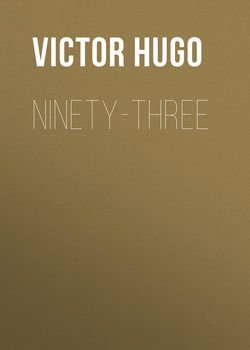Читать книгу Ninety-Three - Victor Hugo, Clara Inés Bravo Villarreal - Страница 15
PART I
AT SEA
BOOK IV
TELLMARCH
II
AURES HABET, ET NON AUDIET
ОглавлениеThe old man sat motionless. He was not consciously thinking, nor yet was he dreaming. Around him was peace, repose, assurance of safety, solitude. Although night had shut down upon the woods, and in the valley below it was nearly dark, broad daylight still rested on the dune. The moon was rising in the east, and several stars pricked the pale blue of the zenith. This man, although intensely absorbed in his own interests, surrendered himself to the unutterable peacefulness of nature. He felt the vague dawn of hope rising in his breast, – if the word "hope" may fitly be applied to projects of civil warfare. For the moment it seemed to him that in escaping from the inexorable sea he had left all danger behind him. No one knew his name; he was alone, – lost, as far as concerned the enemy; he had left no traces behind him, for the surface of the sea preserves no trace; all is hidden, ignored, and never even suspected. He felt unspeakably calm. A little more, and he would have fallen asleep.
It was the deep silence pervading both heaven and earth that lent to the hour a subtle charm to soothe the imagination of this man, stirred as he was by inward and outward agitations.
There was nothing to be heard but the wind blowing in from the sea, a prolonged monotonous bass, to which the ear becomes so used that it almost ceases to be noticed as a sound.
All at once he rose to his feet
His attention was suddenly awakened. An object on the horizon seemed to arrest his glance.
He was gazing at the belfry of Cormeray, at the farther end of the valley. Something unusual was going on in this belfry.
Its dark silhouette was clearly defined against the sky; the tower surmounted by the spire could be seen distinctly, and between the tower and the spire was the square cage for the bell, without a penthouse, and open on the four sides, after the fashion of Breton belfries. Now this cage seemed to open and shut by turns, and at regular intervals; its lofty aperture looked now perfectly white, and the next moment black, the sky constantly appearing and vanishing, eclipse following the light, as the opening and shutting succeeded each other with the regularity of a hammer striking an anvil.
This belfry of Cormeray lay before him at a distance of some two leagues. He looked towards the right in the direction of the belfry of Baguer-Pican, which also rose straight against the horizon, and the cage of that belfry was opening and closing like the belfry of Cormeray. He looked towards the left at the belfry of Tanis; the cage of Tanis opened and closed like that of Baguer-Pican. He examined all the belfries on the horizon, one after another, – the belfries of Courtils, of Précey, of Crollon, and of Croix-Avranchin on his right hand, those of Raz-sur-Couesnon, of Mordray, and of the Pas on his left, and before him the belfry of Pontorson. Every belfry cage was changing alternately from white to black.
What could it mean?
It meant that all the bells were ringing, and they must be ringing violently to cause the light to change so rapidly.
What was it, then? The tocsin, beyond a doubt. They were ringing, and frantically too, from all the belfries, in every parish, and in every village, and yet not a sound could be heard.
This was owing to the distance, combined with the sea-wind, which, blowing from the opposite direction, carried all sounds from the shore away beyond the horizon.
All these frantic bells ringing on every side, and at the same time this silence; what could be more appalling?
The old man looked and listened.
He could not hear the tocsin, but he could see it. Seeing the tocsin is rather a strange sensation.
Against whom was this fury directed?
Against whom was the tocsin ringing?
